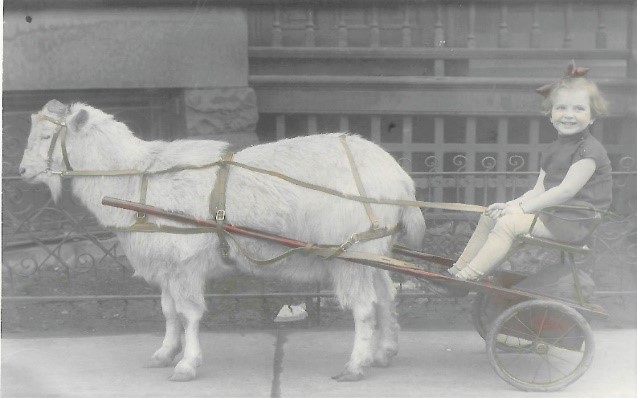“Our second daughter was born shortly before Karl got accepted into pre-medicine at the University of Utah, which was then only a two-year school. It was a long and difficult labor and delivery, but not as difficult or tragic as the first. The university had a contractual arrangement with Rush Medical School in Chicago; so, being accepted at the U. medical school made it a sure thing that Karl would be able to finish his M.D. degree at Chicago four years later, if we survived. To make ends meet—always a struggle, a close thing which was essentially hand-to-mouth–Karl took a backbreaking job as the night janitor for the University’s huge Kingsbury Hall seven days a week, in addition to all his studies; and together, we turned our apartment on 12th East into a boarding house and used up our meager savings to buy some second-hand furniture.
“We couldn’t afford a car; so, I used to bundle up our baby and put her into a little red wagon. Remarkably enough, one of the boarders was the same doctor who had killed our baby. He felt wretched; and to make amends, he overpaid his rent, which really helped. We then walked the eight blocks to downtown Salt Lake City to get groceries for our family and our boarders. There were a lot of empty apartments in the city because of the Depression. Owners were having them cleaned and fixed up to attract renters. So, Karl and I cleaned apartments as well as our other jobs.
“My father still had his job as county auditor, but he didn’t make enough to help us. Karl’s father—we called him Papa—was still making a living. Many of his patients paid him with food, bottled fruits, and vegetables, that kind of thing. Sometimes, he would help us out a little bit. We were like everybody else; we went to school on a shoestring. When he graduated in 1932, Karl had had two years of junior college, two years of pre-med, which gave him a BA degree, and two years of medical school. He was twenty-nine, skinny as a rail, and as tough as a hickory log.
“Among our eleven young male boarders were several friends from Ephraim where Karl grew up, a very bright and ambitious young man named Nymphus Hicken, who was determined to become an orthopedic surgeon. I scarcely knew that orthopedics was about. Later, though, Nymph went into OB. The most interesting boarder–one who became a lifelong friend of Karl’s and one of the most famous of all western writers–was Pulitzer Prize winner, Wallace Stegner, most famous for his novels and nonfictional studies of life in the west: Remembering Laughter (1937), The Big Rock Candy Mountain (1943), The Sound of Mountain Water: The Changing American West (1946), Joe Hill, (1950); Beyond the Hundreth Meridian (1954), A Shooting Star, (1961), The Gathering of Zion (1964), All the Little Live Things, (Commonwealth Club Gold Medal) (1967); Angle of Repose, (1971), among many others.
“Wallace said, ‘Most things break, including hearts. The lessons of life amount not to wisdom, but to scar tissue and callus.’ Given the course of our lives, I would have to say that our friend was exactly right in his observation—and prophecy–as it turned out for us. Come summer of our first year, the boarders all left, and I had to close down the boarding house. Finally, I had to go home to Spanish Fork with the baby because the only other option was to starve on the streets. Poor Karl, he had to work at all kinds of jobs and come home to an empty house and often have nothing to eat. I did some extra work and saved a little bit; so, I came back to be with my skeleton of a husband. I found a bakery where I could get a loaf of bread for ten cents, and a round two-layer cake for a quarter. We started up the boarding house again for the last few months. I have to say that I was a good cook, and I fed the boarders well. They liked living with us. Sorry to brag.
“Somehow–by the skin of our teeth money-wise–we made it through the four years at the U. of U. Karl was accepted for the two clinical years at Rush Medical School. That summer, he worked as a field hand twelve hours a day to get some money to be able to start school. He was paid four dollars a week to pick potatoes by hand. And then things got more difficult. I’ll tell you next time, when I have the strength to talk about it—the damnable Depression.


